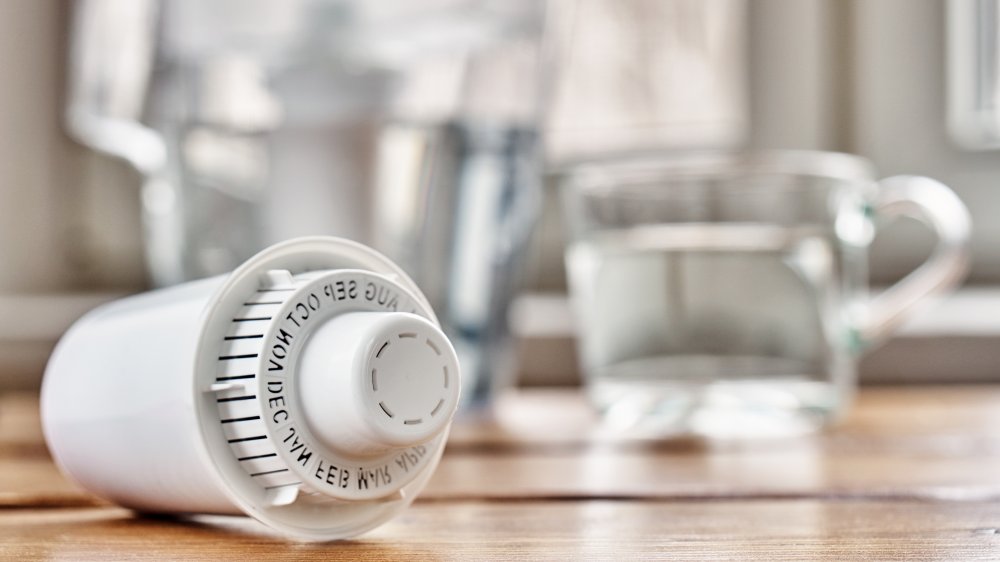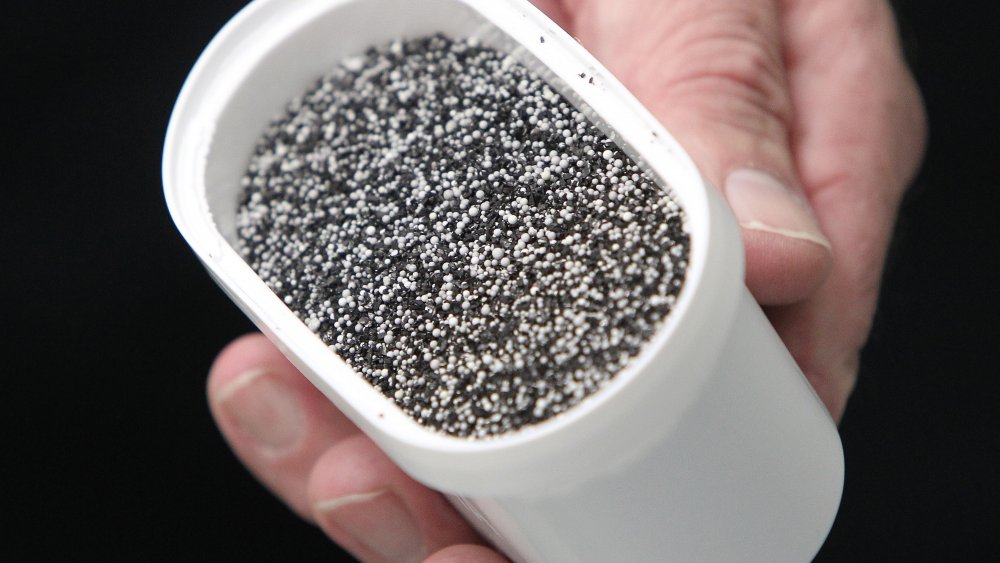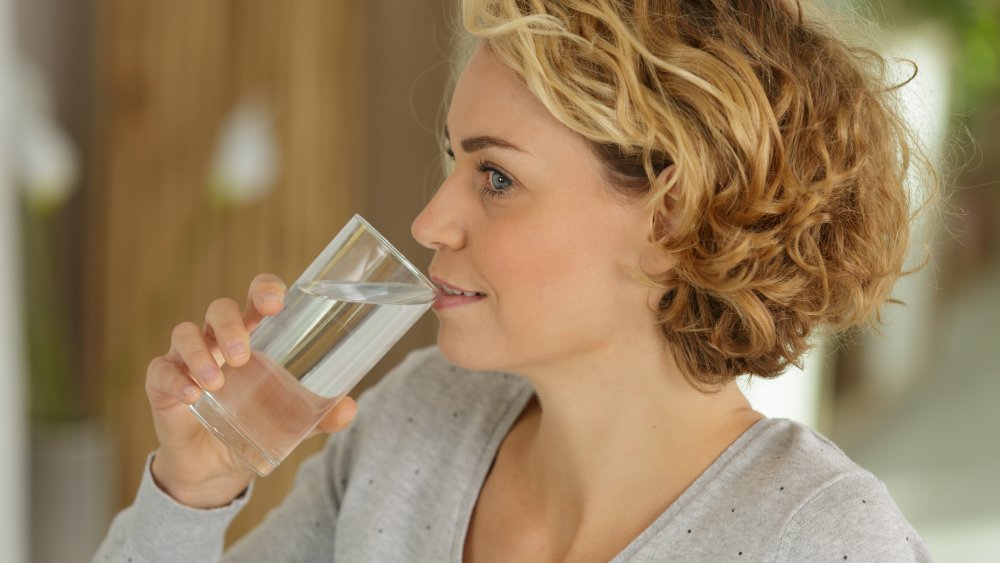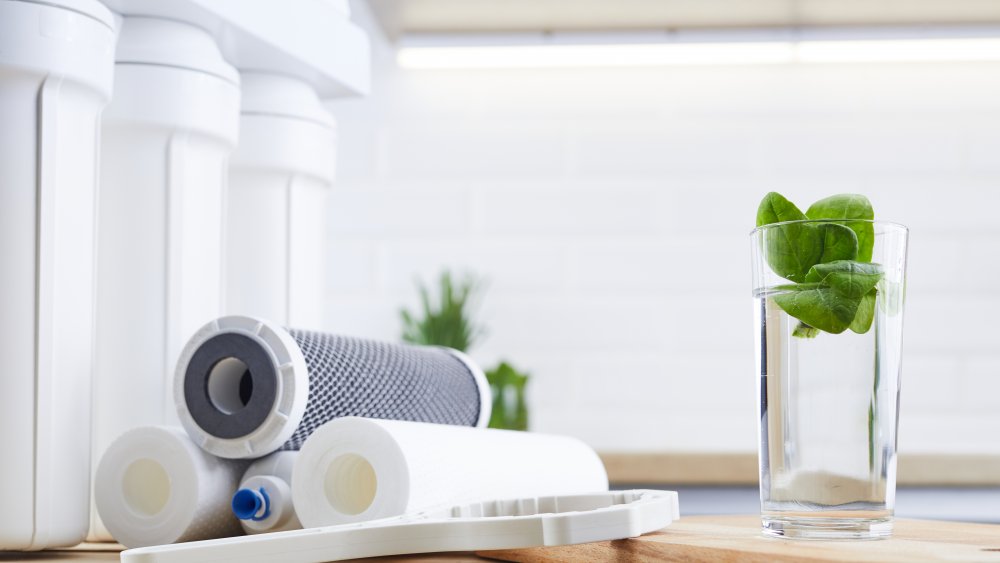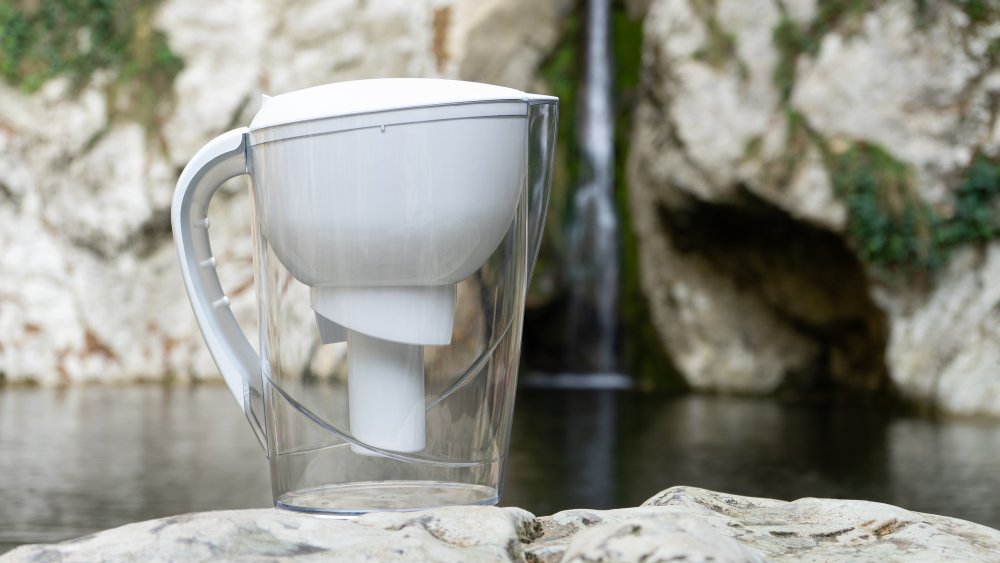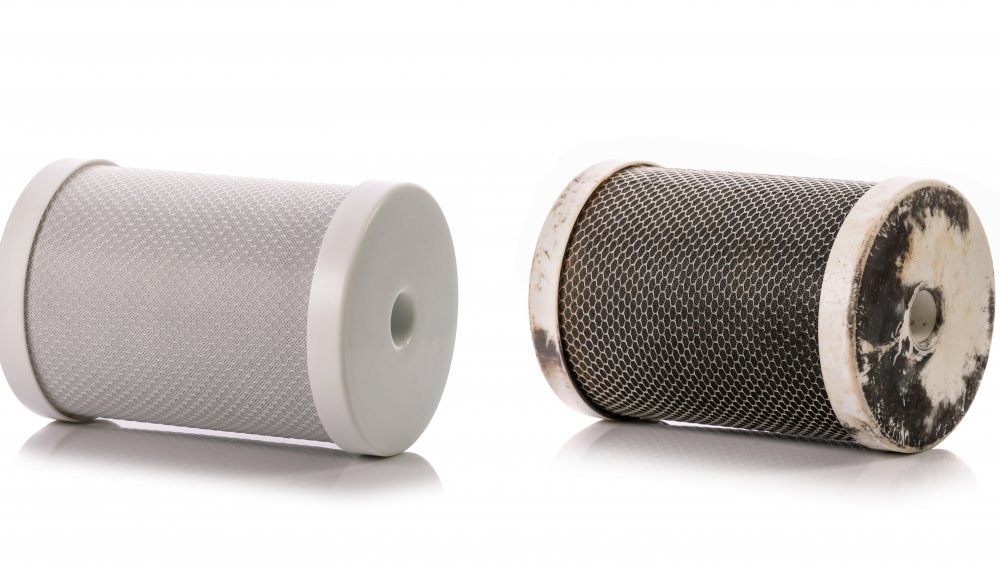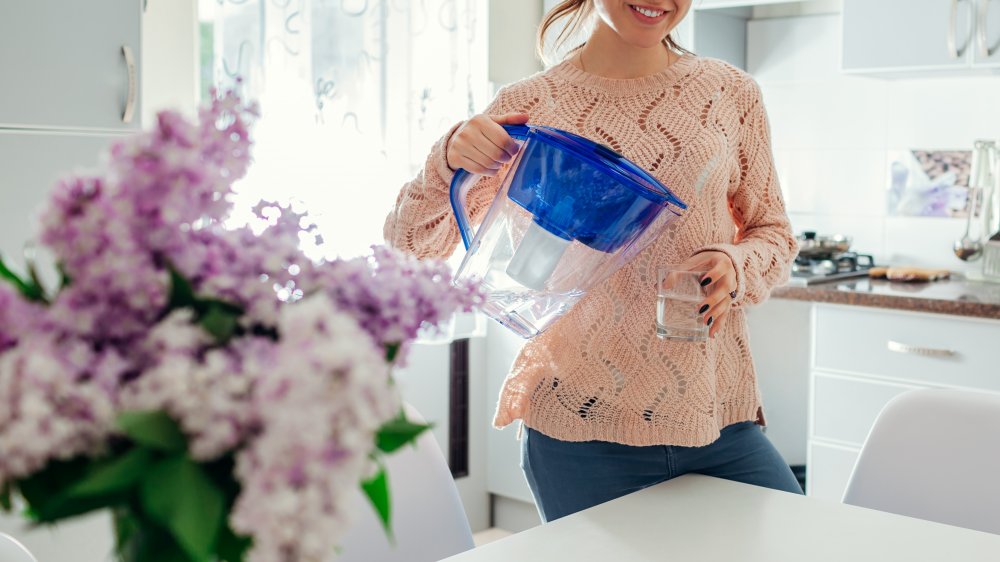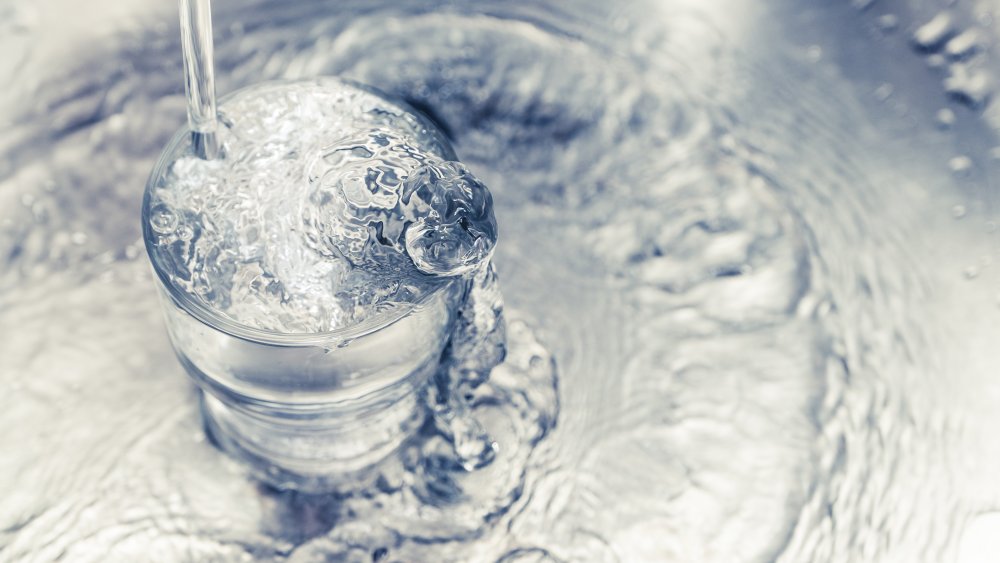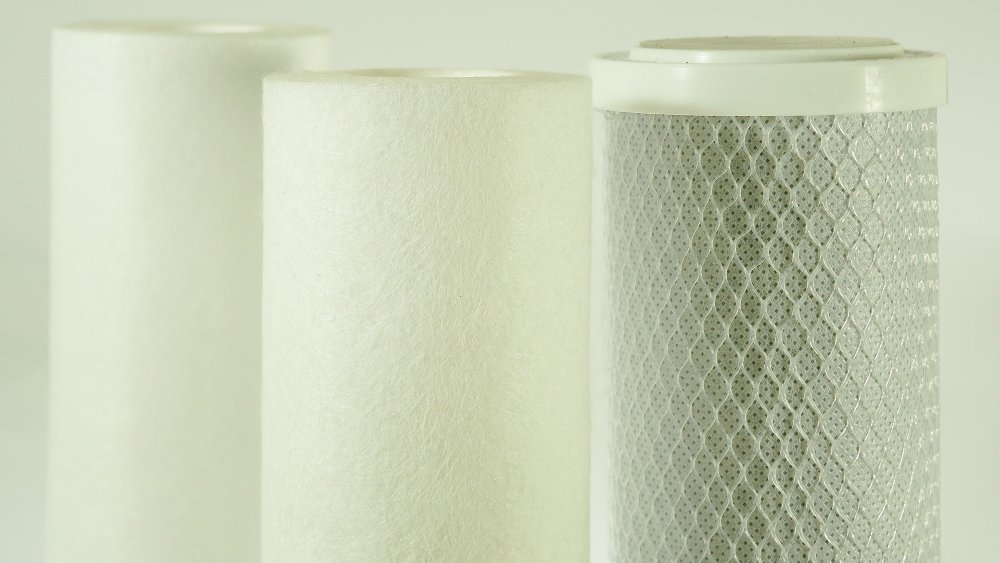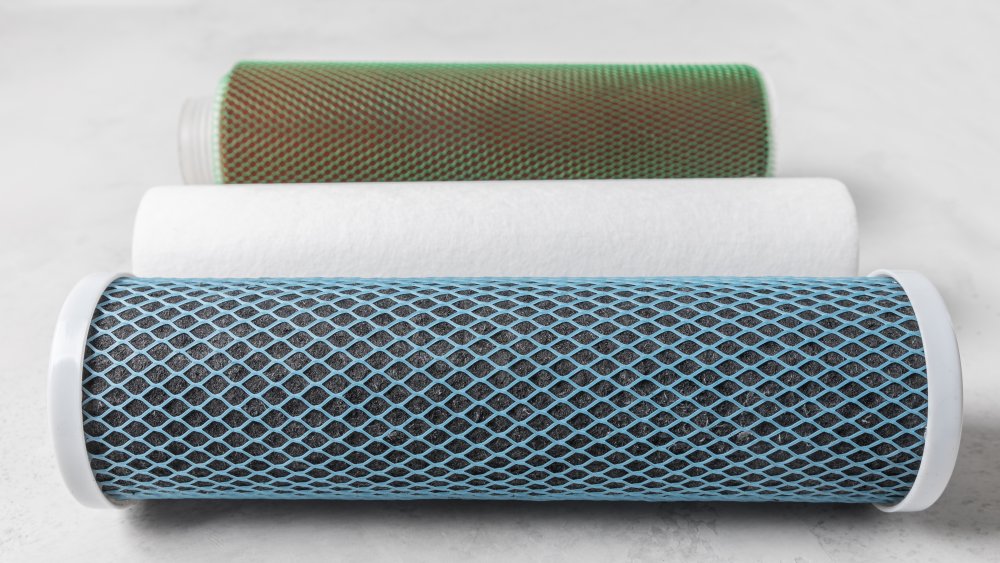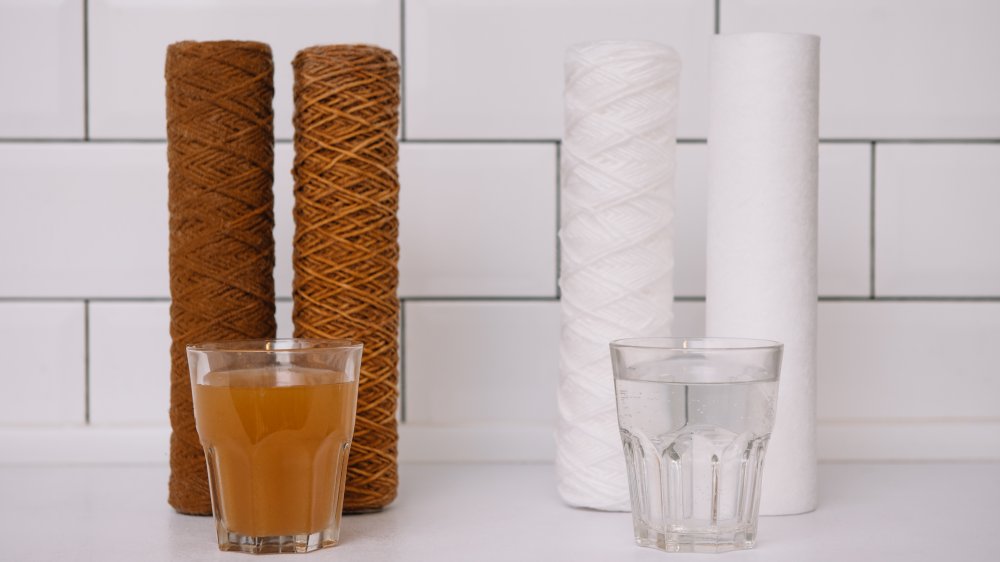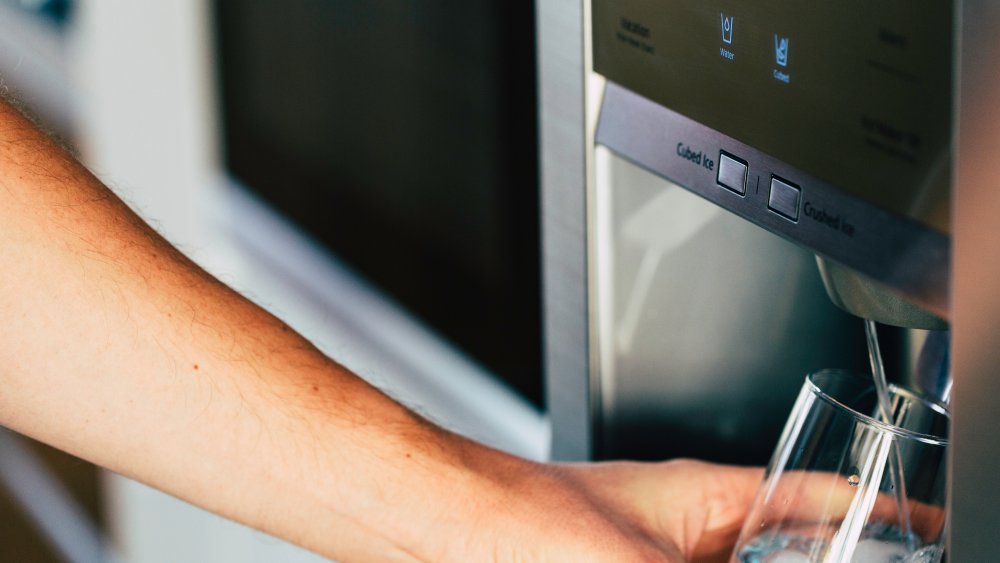The Truth About Water Filters
The next time some youngster asks you what adulting is like, put it this way: "Suddenly, you're concerned your water filter is either dirty, the wrong one, or needs to be replaced, but you can't remember where you put the book that tells you how to do it. You can't remember where you put the replacement water filters, either, so you hit the reset button and figure you'll just worry about it again in a few months."
That's adulting!
Chances are good that most people have a water filter of some kind in their home, but these seemingly simple devices — they just filter water, right? — are surprisingly complex. There's a lot of legitimate questions that come with water filters, and given the fact that it's a matter of keeping your whole family healthy, you really should ask them. Do you really need to use a water filter? Are they worth the insane amount of money they cost? Do you really, really need to replace them? Are they really making your water safer to drink?
Don't worry — we have the answers. This is the truth about water filters.
Water filters are way older than you'd think
Here's a fun bit of trivia — water filters aren't a modern invention.
According to Lenntech Water Treatment Solutions, the basics of water purification go back to 2,000 BC. Records from ancient Greece, Egypt, and India show that they knew how important clean water was, and it was boiled and filtered, usually through sand or gravel. In 500 BC, Hippocrates developed something we'd recognize as a water filter. He called it the Hippocratic sleeve, and it was essentially a cloth bag he'd pour water through in order to strain out sediment.
While Rome had built a massive system of aqueducts and infrastructure, the fall of Rome destroyed much of that and put a lot of things on hold. It wasn't until 1627 that Sir Francis Bacon tried straining salt from water through sand.
By the 1700s, some homes were using filters made from sponge, charcoal, and wool, and filtration wasn't done on a municipal scale until Scotland built the first water treatment plant in 1804. In 1854, a cholera epidemic swept through London and we discovered that even though water might look safe to drink, it wasn't necessarily clean.
Water Filters Australia says it was Queen Victoria who really increased the popularity of home water filters, specifically in the form of pottery crafted by Royal Doulton. Carbon filters came along in 1862, and all that was left was to perfect the idea that people had been working on for centuries.
Most water filters have a physical and a chemical component
There are a few different kinds of filters, but most work on the same general principle. According to Explain That Stuff, most filters have two parts that work together to remove impurities from the water. First, there's a physical part — which is where the water is strained through something like a fine mesh — and that usually takes care of the larger impurities.
The other method is chemical filtration, and at a glance, this sounds pretty similar. Here, though, the water passes through something — like activated carbon — where there's a chemical reaction that causes the impurities to be pulled from the water and into the filter.
Activated carbon filters are the most common when it comes to household use, says Frigidaire. That's because it's sort of the best of both worlds. Larger particles get caught on the surface of the charcoal, and the carbon absorbs some of the other contaminants you don't want in your water, particularly lead and volatile organic compounds, or VOCs. Then, there's a chemical reaction happening here, too, and it's that reaction that helps get rid of the chlorine in the water.
The primary function of most water filters will surprise you
Here's a quick question: why do you suppose most people opt for installing water filters in their home, or picking up a filtration pitcher?
According to the Centers for Disease Control and Prevention, one of the most common reasons people start looking into filters is that they don't like the way their water tastes. Sometimes when you drink tap water, you're tasting the chemicals that are making it safe. Since it's such a popular complaint, many of the most popular refrigerator and pitcher filters are designed to improve that taste.
Another common reason for water filters is that families might be worried about lead leaching into their water from their plumbing. They may also have concerns that arsenic is making its way into the water source — although that's typically a greater concern for anyone who's got a private well. Nitrates, too, can get into the water supply of a well, and anyone who's dealing with a medical condition that has compromised their immune system should be very particular about choosing their water filter.
There are a ton of different water filter options out there
When it comes to picking a water filtration system, there are more options out there than you probably realize, and the CDC says they're not all created equal. It all depends on what you need, as well as how much time and money you're willing to spend.
Look at those water filtration pitchers, for example. Sure, they're easy to use and require nothing special, but if you drink a lot of water — or make a lot of lemonade, iced tea, or anything of that sort — waiting for the water to run through the filter is going to get very, very tedious.
Refrigerator filters are great, and most also filter the water that's used in the ice maker. But those filters need to be replaced pretty regularly, and that can get costly. If most of your water comes from the tap, you can also install a faucet-mounted filter. Some require a professional installation, though, and you might find it slows down your water flow a lot. Some might even require modifications to your existing plumbing, so the first thing is to decide how far you're willing to go. The same is true for under-the-sink filters, but if you're looking to save space and filter all your water, it might be worth it.
Then, there are plenty of options for a whole-house water treatment system, which might be handy for those using a well, or with particularly hard water. It'll treat all the water coming in, but it might require not just professional installation, but regular maintenance, too. Take the time to weigh the pros and cons!
Water filters don't all do the same thing
So, you're going to get a filtration pitcher to encourage you to drink more water. Just a quick Amazon search will show you there are a ton of options out there... so now what? They all look basically the same. Is there really a difference?
Consumer Reports says that there is. When they started testing pitchers to see which did the best when it came to removing funky tastes, they also read the fine print and found that most pitchers claim to remove contaminants that make your water taste funky. Those are things like zinc and hydrogen sulfide, and that's great. But, if you're worried about the presence of something like lead, pharmaceutical compounds, or those volatile organic compounds, they found that the majority of pitchers didn't take care of those compounds. And that's important. Say you're going camping, and figure you'll take a pitcher along to clean up your drinking water. It might not work.
And even if you're just using it at home, CR warns that lead-free plumbing was only mandated in 1986, and homes built before that may still contain lead pipes. If you're concerned about that, you definitely can't just grab any pitcher or system without doing the research.
Here's why you need to replace water filters even if everything tastes fine
The light in the fridge is flashing again, and it's saying to replace the filter. But the water coming out of it tastes fine, so is replacing the filter really necessary?
Home Revolution draws a helpful analogy, and says you should think of your water filter like the lint tray in your dryer. It's going to collect all kinds of yuck, and if you don't empty it, terrible things are going to happen. The same thing happens in your water filter, and if you don't change it, it's going to become less effective — and that defeats the purpose of even using one. The photo here shows a clean and dirty water filter — do you want to drink from the dirty one?
Different water filters have different life spans, so you'll have to check the literature that came with yours to see how often you need to change it — usually, that's based on either time or the amount of water you've filtered.
According to Fresh Water Systems, if you don't change your refrigerator filter, there's a good chance that all the contaminants it's trapped so far are essentially going to overflow and end up right back in your water. And that can definitely make you sick.
You really need to make sure water filters are "NSF-certified"
If choosing a water filtration system seems overwhelming, here's one way to help weed out the ones that aren't worth your time. According to the CDC, one of the best things you can do is look for the "NSF" mark. That means the product has been evaluated by NSF International, an independent research company that tests all kinds of products to make sure they comply with public health standards, and their label lets you know the results.
NSF International regularly tests and performs spot tests on products to make sure they're continuously up to standards, and when it comes to your family's health, that's exactly what you want.
Among the specific standards the NSF tests water treatment products for are distillation, cyst reduction, reverse osmosis, and taste and odor — in other words, whatever you want your water filter to do, NSF will be able to tell you how well it does it. If you don't see their stamp of approval, keep looking.
Yes, bacteria can build up in those water filters
Water filters might filter out a whole lot of bad stuff, but that's not to say they're perfectly clean. According to a study done by the University of Michigan (via Michigan NPR), quite the opposite is true.
Researchers took a look at just how much bacteria came out of water filters, and said, "The count of bacteria coming out of the filter increases relative to what was going into the filter. And we see that those counts can increase up to 100 times."
While they stress that not all bacteria is the dangerous kind, there are some follow-up footnotes to that. If you opt for a whole-house filter that removes chlorine from your water, the CDC warns that there's a chance you could end up increasing the amount of bacteria and germs that live inside your plumbing.
That's food for thought, and so is this important warning from the CDC: Water filters are incredibly important for anyone who has a compromised immune system, like those going through chemotherapy or other cancer treatments. But, because of the bacterial build-up that occurs in water filters, those people shouldn't be the ones changing cartridges. Even healthy individuals should wear gloves when replacing the cartridges, and wash their hands thoroughly after.
Why on earth are water filters so expensive?
The term "sticker shock" doesn't even begin to explain how it feels when you go to buy those replacement water filters. Whether they're pitcher filters or refrigerator filters, it seems like they're almost irrationally expensive. What's going on here?
In a now-deleted blog post, Glacial Pure said there are a few things that contribute to the high cost of replacement filters, and the cost of the high-quality raw materials needed to make sure filters are doing what they're supposed to is only part of the story. There's also a ton of research and development that goes into producing water filters, and once they're done, there's a lot of testing that has to happen before they hit the market. It's not just a matter of a single test, either — it's a matter of a range of tests, including special tests for heavy metals, for residual chlorine, and particles... and so on, and so on.
You'll be forgiven for thinking that all just seems like excuses, and Consumer Reports took a look at whether or not expensive water filters really are better. They found that they absolutely were, and there's only a single after-market filter that had legitimate credentials and test results (to go along with a lower price tag) — and that's Culligan. And even they didn't have the same kinds of certifications as the more expensive models, suggesting water filters are one time that you definitely get what you pay for.
Counterfeit water filters are actually a thing
When you think of things that are often counterfeited, you probably don't think of water filters. But you should — according to Salon, the counterfeit water filter industry is posing a major health risk.
It turns out, it's a lucrative market. Water filters are expensive, after all, and they're one of those things people are happy to try to get cheaper. There's also so many of them out there, they're hard to research — and that means there's a ton on the market that haven't been evaluated.
There's a bigger problem — not only do they not actually work to improve water taste or remove contaminants, they can actually leak contaminants into the water. According to the Association of Home Appliance Manufacturers, counterfeit filters have been found to leak arsenic, among other carcinogenic substances.
It's estimated that there are millions of these fake water filters on the market, and it's so serious that US Customs and Border Patrol has started seizing them. Between 2016 and 2018, they nabbed more than 150,000 of them, before they reached the Amazon seller they were destined for. They warn consumers to be vigilant. These fakes often try to mimic legitimate companies, but if they look like they're not quite right, well, they're probably not right.
Do you really need to have a water filter? The answer may surprise you
Here's the thing — there's a good chance you might not even need a water filtration system. According to the CDC, the US has one of the safest public water systems in the world. It's closely monitored by the Environmental Protection Agency, and information about each of the more than 150,000 public water systems in the country is freely available. In fact, every year, around July 1, you'll get something in your water bill called the Consumer Confidence Report, or CCR. It's essentially a report on the quality of your drinking water, and it's something that's good to know.
Healthline took a closer look at the question, and found that it's not always a clear-cut answer. According to their research, there are a few things that can make drinking water unsafe, like lead plumbing, and being in close vicinity to contagions, like pesticides and industrial waste. And yes, they confirm that contaminants can still be present in the water that comes out of your tap, even if it's been treated at a water treatment facility. But, they also stress that water can be just as dangerous if it goes through a filter that hasn't been properly maintained or replaced — so it's incredibly important to be extra vigilant, whether you choose to use a water filter or not.
You might want to just take the water filter out of your fridge
Before you start looking into massive water filtration systems, reach out to your county health department. They'll be able to refer you to state certified laboratories that do testing on drinking water, and they'll be able to guide you through the process of testing your water and figuring out if you really need filters. If you don't, you can ski[ it and save yourself some cash.
It's entirely possible that you can cut back on your home's maintenance costs by just getting rid of some of your filters. Removing them is safer than never replacing them, and according to Consumer Reports, most fridges don't need to have a filter in place to function properly.
Only Frigidaire and Electrolux absolutely require a water filter to be in place if you want to use either the water dispenser or the ice machine. All other brands don't — so you can definitely just remove it and save yourself some serious cash.
